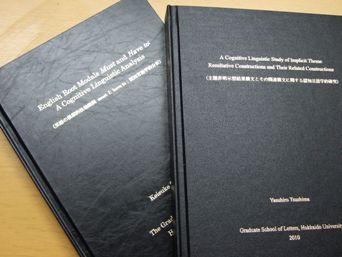Profile
- Research Subject
Cognitive grammar study of complex sentences, with special emphasis on internally-headed relative clauses in Japanese.
- Research Fields
- English linguistics, cognitive linguistics, semantics
- Faculty - Division / Research Group / Laboratory
- Division of Humanities / Research Group of Linguistics / Laboratory of Linguistics
- Graduate School - Division / Department / Laboratory
- Division of Humanities / Department of Linguistics / Laboratory of Linguistics
- School - Course / Laboratory
- Division of Humanities and Human Sciences / Course of Linguistics and Literature / Laboratory of Linguistics
- Contact
Office/Lab: 401
Email: nomura(at)let.hokudai.ac.jp
Replace “(at)” with “@” when sending email.Foreign exchange students who want to be research students (including Japanese residents) should apply for the designated period in accordance with the “Research Student Application Guidelines”. Even if you send an email directly to the staff, there is no reply.- Related Links
Lab.letters


What’s the difference between ragan and nikugan? How to recognize the world in terms of language
Ragan and nikugan are Japanese words that are casually used in our daily lives, but can you explain how they’re used differently? Both words refer to how people see things without the aid of instruments, but ragan is used when one sees things without eyeglasses or contact lenses, whereas nikugan is used when one sees things without a telescope or a microscope. However, there’s no specific wording in English corresponding to these terms, so that the language makes do with the same expression for both: “the naked eye.”
Humans view the world through language. As mentioned above, people using a different language construe the world in a different manner, creating their own way of looking at the world. My students strive to clarify the relationship between language, cognition and the world by contrasting English grammar with Japanese grammar.
Elucidate knowledge that hasn’t been visible like a line representing a constellation.
Language represents tacit knowledge, a skill humans acquire naturally, like breathing or walking. By retrieving and analyzing linguistic data in the brain, I strive to discover a mechanism that one uses implicitly. It can safely be said that, like constellation lines drawn to connect the space between stars, the moment when things that have been invisible begin to take form is the best part of learning. When teaching my students, I emphasize the importance of a close reading of the literature. The first place to start is to recognize what you know and what you don’t. Acquiring basic skills for reading and your own way of reading will surely create a further impetus for your research.
Message
English linguistics refers to a discipline aimed at exploring what traits English language bears in terms of English sounds, grammar, lexical meaning and historical change. Every language is the product of the work of the human mind, with the speakers’ efforts to recognize and describe the world from various perspectives inscribed in the mechanisms behind its vocabulary and grammar. In that sense, English linguistics is academic learning aimed at observing and examining the human mind and how it works through the window of English.
Incidentally, to understand the human mind as reflected in the properties of English language, it is not very efficient to focus your research on English alone. Please bear in mind that a good knowledge of languages other than English (including our mother tongue of Japanese) is instrumental in understanding English better.
Last but not least, it goes without saying that those without basic English skills are not qualified to pursue English. It is no exaggeration to say that whether or not you will be able to tackle interesting research depends on your English literacy. You are recommended to regularly improve your English skills via English books or novels, movies or radio lectures. Based on such efforts, learning about English linguistics will help you develop a keener sense of English, contributing to the improvement of your English ability.




